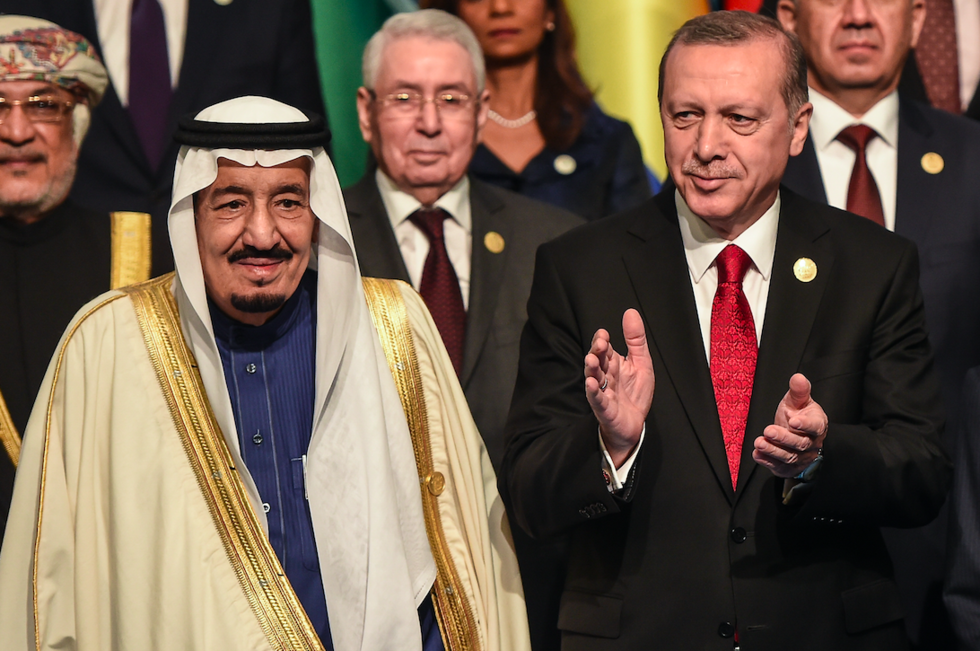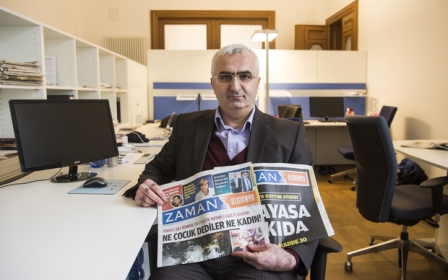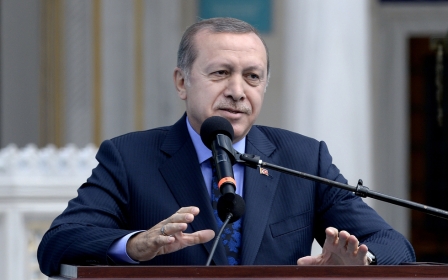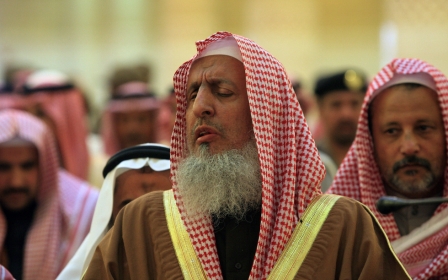Turkey and Saudi Arabia: Are tensions lurking behind the smiles?

ISTANBUL, Turkey - The Turks and Saudis cosied up for a photograph opportunity at the summit of leaders of the Organisation of Islamic Cooperation on Thursday, but some experts say the policy gap between them is too wide for long-term cooperation.
Turkish President Recep Tayyip Erdogan greeted each of the 55 guests upon arrival with a handshake, but a special peck on the cheek was reserved for a select few. The Saudis got one, the Iranians did not.
Unlike the genuine partnership Turkey has developed with the Qataris over the last decade, some observers say the Turkish-Saudi alliance is based on sheer expedience. Recent visits between the two leaders have been conducted with a fanfare that may be partially a consequence of the vacuous nature of the bond.
“This Turkish-Saudi coming together cannot be long term. It is simply a practical move to deal with some short-term issues,” Yalim Eralp, a retired Turkish ambassador who also served at the NATO command, told Middle East Eye.
According to Eralp, on an ideological level the two countries have long been at odds.
In recent years, ties between Riyadh and Ankara were severely tested by their division over how to react to the Muslim Brotherhood (MB) in Egypt and elsewhere. The Saudis fought against their rise, seeing them as an existential threat, but Ankara backed them as a matter of principle. While Turkey's ruling Justice and Development Party (AKP) has no direct ideological ties with the MB, it opposes the overthrow of democratically elected governments because of their Islamic-based politics.
These divisions are not new. Turkish media were quick to point out the contrast between Saudi King Salman’s state visit and the fate of his great-grandfather, who was publically executed in Istanbul for starting an armed Wahhabi insurgency against the Ottoman Empire. Even after Mustafa Kemal Ataturk came to power in the 1920s, the new Turkish Republic all but ignored the Saudis for decades, choosing to look to Europe instead of the Middle East.
Much has been made of the Saudi-led 34-nation Islamic Military Alliance to Fight Terrorism. Turkey was one of the first countries to sign up, yet it has not made any firm commitments.
Even in the Northern Thunder war games held in Saudi Arabia in mid-February, Turkey participated only as an observer. Ankara has, however, allowed Saudi fighter jets to use its Incirlik airbase, used also by the US and by other coalition partners for attacks against the Islamic State group.
“As a NATO member, Turkey cannot just enter military alliances as it pleases. It could impact Article 5, which is the cornerstone of NATO,” said Eralp. “This Saudi-led military alliance is more a moral project. I don’t think it has any military significance.”
Article 5 in the NATO charter concerns collective defence, where an attack on one member is considered an attack on all members.
This is in sharp contrast to the genuine military agreement made with Qatar, where Turkey is building its first military base in the Gulf.
But Muhammed Zahid Gul, a political commentator and writer in various Arabic-language media, told MEE that the relationship is only going to strengthen.
He said he knows of 14 agreements in the pipeline between Riyadh and Ankara, many of which concern military investment.
“Many of these soon-to-be-signed agreements are about Saudis investing in Turkey’s military and armaments industry and getting Turkish-made military hardware in return. This does not violate any of Turkey’s NATO obligations,” he said.
According to Gul, while ideological differences may exist, current geo-political conditions have made them irrelevant.
“Due to the increasingly sectarian nature of conflicts in the region, Turkey and Saudi Arabia now simply have to see themselves as Sunni instead of wondering how Turkey can be more compatible with the Wahhabi Saudis,” Gul said.
“This applies to wider regional issues as well. For instance, there is no real ideological similarity between the Muslim Brotherhood and the majority of the Turkish leadership. So that shouldn’t affect things.”
Both countries feel let down by their major ally, the US, in different areas. The Saudis fear they are being ignored as Iran grows in prominence and becomes increasingly aggressive in the region.
The Turks, meanwhile, see the US as no longer a reliable partner, particularly over Syria and perceived US support for Kurdish factions there, which Turkey fears will cause further issues with its own Kurdish minority.
Turkey, like many countries in the West and elsewhere, is also keen to maintain optimal ties with resource-rich Riyadh, hoping to secure investment and capital.
Gul said that an accord made today to establish a strategic council of cabinet officials from the two countries meeting at regular intervals to smooth coordination “is a major step in firmly establishing this alliance”.
Still, for all the unifying gestures, there continue to be signs of tensions beneath the surface.
Another signal that Ankara may not be ready to fully align with the Saudi position came in January, when tensions flared over the Saudi execution of Shia cleric Nimr al-Nimr.
Although Erdogan had harsh words for Iran and sided with the Saudis, Turkey did not respond to further pressure from Riyadh. Unlike other Gulf states, he refused to withdraw Turkey’s ambassador from Tehran and maintained normal relations.
The Saudis have also fallen flat in their attempts to reconcile Cairo and Ankara, which have been extremely frosty since Egypt's Saudi-backed president, Abdel Fattah al-Sisi, helped overthrow the democratically elected Muslim Brotherhood President Mohamed Morsi.
Egypt sent only its foreign minister, Sameh Shoukry, to the OIC summit in Istanbul and he did not participate in the traditional group photo, leaving the summit after reading Sisi’s message.
According to Eralp, Turkey’s policies in the Middle East have become so convoluted that they have begun to hurt the country’s image.
“Egypt represents just one Turkish foreign policy blunder. Turkey’s image has been so badly damaged that even such close ties with the Saudis no longer make it any worse.”
New MEE newsletter: Jerusalem Dispatch
Sign up to get the latest insights and analysis on Israel-Palestine, alongside Turkey Unpacked and other MEE newsletters
Middle East Eye delivers independent and unrivalled coverage and analysis of the Middle East, North Africa and beyond. To learn more about republishing this content and the associated fees, please fill out this form. More about MEE can be found here.




